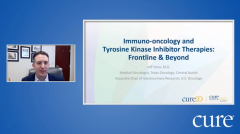
Educated Patient® Kidney Cancer Summit IO/TKI Therapies Presentation: April 9, 2022
Watch Dr. Jeff Yorio, from Texas Oncology, discuss treatment with the combination of immunotherapy and tyrosine kinase inhibitors, during the CURE Educated Patient Kidney Cancer Summit.
Episodes in this series

Years ago, there were limited treatment options for patients with kidney cancer, and those that were around — such as interkeukin-2 — tended to be very toxic and bring on major side effects.
However, with the advent of immunotherapy and tyrosine kinase inhibitors (TKIs), patients with the disease are living longer and better than ever, according to Dr. Jeff Yorio, a medical oncologist at Texas Oncology, who presented on the topic at the CURE® after the Educated Patient® Kidney Cancer Summit, held April 9, 2022.
“Kidney cancer was never very responsive to chemotherapy drugs that we’ve had around for longer, so for years, we had very little to offer patients with advanced kidney cancer,” Yorio said in an interview with CURE®. “So now you’ve opened up this whole new world where we’ve got TKIs…and immunotherapy — two different types of pathways to go down that we didn’t even have 20 years ago.”
Immunotherapy
When it comes to immunotherapy for kidney cancer, these drugs started off being used in the second-line treatment for patients with advanced disease, but combinations
Additionally, other immunotherapy drugs like Keytruda (pembrolizumab) are now approved by the Food and Drug Administration (FDA) to be used after patients with high-risk, stage 2 kidney cancer undergo surgery.
“Immunotherapy, of course, is trying to hone in on your immune system’s ability to fight cancer,” Yorio explained. “A lot of cancers like kidney cancer have an inherent way that they’ve tapped into the immune system and figured out a way to hide and put the brakes on the immune system. What drugs like Keytruda, Opdivo and Yervoy do is try to unmask the cancer so that the immune system (can) recognize the cancer being there and stimulate an immune response (against cancer cells).”
TKI Treatments
Immunotherapies are sometimes used in combination with TKI therapies, which are drugs that inhibit enzymes called tyrosine kinases that are involved in cancer cell functioning. For example, Yorio mentioned that there have been promising results in using
“Kidney cancer cells tend to be a very vascular type of cancer,” Yorio said. “And so blocking that ability for them to recruit new blood vessels and grow can really help control the (cancer) growth and shrink them down. These drugs hone in on those types of enzymes and basically stopped them from growing.”
Choosing the Right Kidney Cancer Treatment
With more treatment options than ever before, there often lacks a clear cut way to decide which therapy a patient should get, especially since there is no clinical trial data with head-to-head comparisons of these newer drugs and combinations, according to Yorio.
That said, for someone with stable disease without a high disease burden, Yorio added that he would consider first trying treatment with Opdivo and Yervoy. While not everyone’s disease responds to immunotherapy, for those who do have responses, they tend to be long-lasting.
For patients with high disease burden who are feeling sick and need their cancer to respond to treatment right away, Yorio said that he may opt for an immunotherapy/TKI combination, which tends to induce responses in a higher proportion of patients, though the responses may not be as long-lasting as those that are seen with immunotherapy.
“It’s tricker in picking which (treatment) is the best one…To be honest, there’s not necessarily a graded, perfect choice. They’re all pretty good options,” Yorio said, noting that potential side effects of each therapy, as well as cost and insurance coverage are also considered when crafting a treatment plan.
Yorio said that things are just getting started when it comes to the optimal use of TKIs and immunotherapy in kidney cancer.
“There’s a whole new world of cancer treatments that has really come about in the last 10 years,” Yorio said. “We’re hopefully at the tip of the iceberg with immunotherapy, and it’s opened up this whole new (field of) science. It’s the same with TKIs.”
For more news on cancer updates, research and education, don’t forget to















